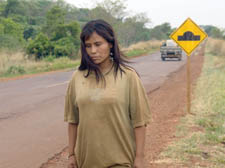|
|
 |
| |

Alicélia Batista Cabreira as Lia |
Tribal plight well worth watching
BIRDWATCHERS
Directed by Marco Bechis
Certificate TBC
FROM a dramatic opening scene that brings the viewer flying from high down through lush vegetation of a forest, to the realisation that beneath this stunning, lush scenery is as dirty and horrible story lurking as you can possibly imagine, Birdwatchers is a gripping and subtle tale of the lot of Brazilian Indians.
While it could be a depressing yarn of white fat cat land owners
robbing the indigenous Guarani-Kaiowa people of their land, there is much more to this film that that.
We meet Indians Osvaldo and Lia as they are hutning on land
supposedly “owned” by a sugar beet farmer – genetically modifed crops of this sort are used to produce ethanol, which powers Brazil’s industry and cars. Chased by a ranchero on horseback, they stalk through the forest, until they come across two of their tribespeople
hanging from trees, nooses round their necks. But this is no lynching – they have taken their own lives.
It so transpires that suicide is rife among these small communities. As the modern world steals the land they have lived on for centuries, they have lost not only the means for a decent livelihood but a connection with their past. As we discover, this dislocation is a spiritual tragedy for them.
They decide that with economic prospects so bleak and suicides rising, they have to fight back: led by tribal leader Nadoio and his village’s Shaman, they set up a camp on the fringes of a land owner’s farm.
A face-off ensues, and it is here that the film takes an unexpectedly intellectual twist. This could have been a straightforward goodie versus baddie scenario, but instead the two sides have more intricate relationships that play out.
There is a curiosity between the two groups, exemplified by a relationship that develops between Osvaldo and farmer’s daughter Maria.
Director Marco Bechis has had a longstanding interest in the indigenous peoples of the area. Born in Chile with an Italian father, he was expelled from Argentina in the late 70s for his political beliefs and settled in Milan. He had long studied the “American Conquest”, considering how the native Americans had their cultures devastated by invasions and land grabs.
It gives this film a strong political edge, but this is no dry treatise on the hugely unfair battle between a traditional culture and the rampant greed of land-grabbing capitalists. Instead, we are introduced to wonderful lead performances by Abrisio da Silva Pedro and Alicélia Batista Cabreira. What really stands out is how the main players are native Brazilians – Bechis took large groups of people who have never acted before and who do not have a
cinematic heritage.
He had to teach the actors from scratch, give them an understanding of what film is about, and how actors are caught on camera. It makes their performances all the more impressive, and they have been given a rivetting story to perform. |
 |
|
 |
| |
|
 |
|

